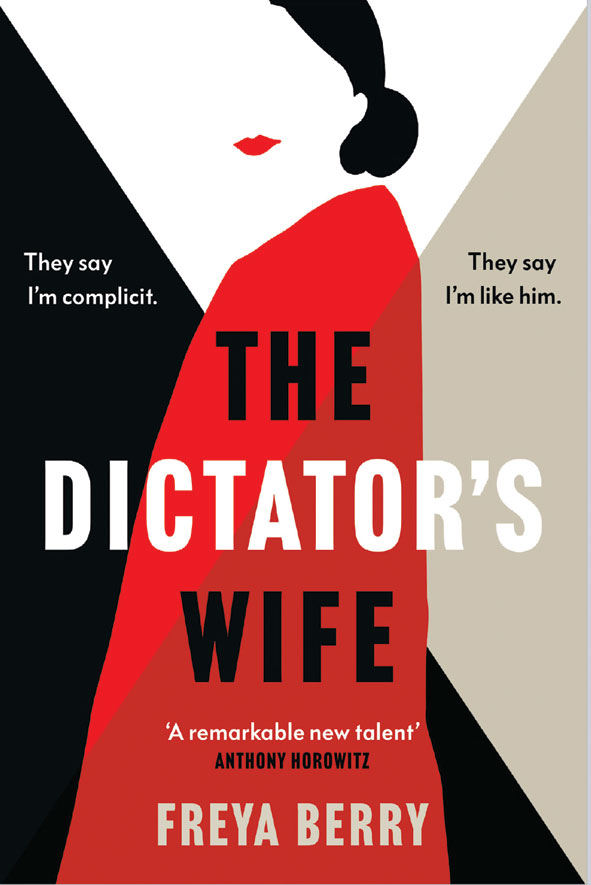Bristol-born author and former journalist Freya Berry had front row seats to the 2016 US election, reporting live from New York. However, as the world’s eyes became fixed on the future president of the United States of America, Freya became obsessed with the first lady and the part she played in the campaign. In Freya’s debut novel – out now – she delves deeper into the lives of world leaders’ wives…

From the moment we first encountered Bristol-born author Freya Berry’s debut novel last month our curiosity was certainly piqued. It follows the story of a captivating, glamorous dictator’s wife as she stands trial for her dead husband’s crimes. It’s a story of secrets, lies and seduction; of female power and ambition; of mothers and daughters, all set in post-Cold War Eastern Europe. It’s a story, ultimately, that poses the question: how far can the wives of world leaders be blamed for the actions of their husbands?
The Dictator’s Wife hit the shelves of bookshops around the country just 12 days ago (17 February) but before readers even had a chance to crack the spine, endorsements had rolled in from Anthony Horowitz CBE (creator of the Alex Rider series), Glamour magazine had dubbed it a top pick of 2022 and Waterstone’s had celebrated it as one of the best books of February. When we caught up with Freya last month, she was flying high on the news that her first title was set to be a hit – and deservedly so. Not only does this fictional novel hold incredible relevance in today’s world – exploring the way in which glamorous spouses are deployed to give a pretty face to tyranny – but the inspiration behind it came from watching exactly that unfold in front of her very eyes.
Freya, a former Reuters and Daily Mail journalist, spent time in New York covering the 2016 US election – an election, as we all remember, that was steeped in controversy. While the public’s attention was focused on the bravado of President Donald Trump, however, Freya’s eyes were firmly fixed on the first lady. She couldn’t help but wonder: was Melania Trump – and are wives like her – birds trapped in gilded cages, desperately trying to humanise their husbands, perhaps only guilty of grandiosity? Or do they help prepare the kindling before their husbands set democracy alight?
“I’d covered Brexit for Reuters just months previously, so at the Daily Mail in New York I really felt that same sense of history, of the world shifting before my eyes, and of course sheer surprise at the result,” Freya tells us. “It was such a shocking, turbulent election process with so many twists and turns – Access Hollywood, the Clinton FBI investigation… We were up all night and I had the ‘Hillary wins’ piece ready to go – we’d done a ‘Trump wins’ piece too but it was nowhere near done. As the states kept toppling, we had to do a hasty rewrite!
“The idea for the novel first came to me while I was out there. I’d been observing Melania Trump and her enigmatic silence, and wondered what she was like in private. Then I remembered the glowing 2011 Vogue profile of Asma al-Assad [the First Lady of Syria], which was published just weeks before the civil war broke out. It was such an odd piece – glamour in front, darkness behind – and I just became totally hooked on this subject. Who are the women on the arms of the world’s strongmen? How do they come to be there? Why do they stay?”
As Freya delved deeper into the role wives play, she looked at whether their femininity could help whitewash their husbands’ actions, whether their charity work could act as a public distraction from the brutal realities of their husbands’ regimes. Throughout history, many wives have often walked the tightrope between political survival and being overthrown, even executed, while many others have benefited from a fortune of billions while living in a country suffering staggering hardship.
Who are the women on the arms of the world’s strongmen? How do they come to be there? Why do they stay?
When we first meet Marija Popa, the dictator’s wife that Freya created, and a former actor and businesswoman, she has endured the murder of her Hitler-admiring husband, Constantin, a feared dictator who stole from his people. Marija is on trial for his crimes. Stoic in the face of a possible death sentence, her story is very much reminiscent of that of Imelda Marcos – a former First Lady of the Philippines and convicted criminal, who, along with her husband Ferdinand Marcos, stole billions from the Filipino people. Imelda’s infamous quotes have even been cleverly reworked and woven into the dialogue.
Narrating the story is Laura Lăzărescu, a young British lawyer working on the case. She is clearly in awe of the enigma that is Marija. She tells us that Marija once found a friend in Ronald Reagan, Paul Newman and Saddam Hussein and was well liked by the Queen. She wonders about the impact Marija, and women like her, must have on their husbands. “[Marija is] a hypnotic blend of Joan of Arc and Imelda Marcos; both goddess and she-devil, princess and tyrant, martyr and uber-bitch,” it reads, but the question remains: does Marija have blood on her hands? Should wives be punished for the crimes of their husbands?
“I think these wives can soften their husbands, but their often-glamorous presence can also distract us from what’s really going on. The word ‘glamour’ means ‘spell’ after all,” says Freya. “I read books about Imelda Marcos, the Romanian dictator’s wife Elena Ceausescu, and Mao’s wife, Jiang Qing. These women were often double-sided – part adored, part reviled – I wanted to capture that ambiguity in the novel.”
“The instant I thought of my dictator’s wife, I wanted to create someone who would really lure you in – the spider at the centre of the web – but wasn’t just a femme fatale. She had to be something much more powerful and interesting. These first ladies are often maternal figures, called ‘Mother of the Nation’ or similar titles, so the theme of motherhood and what it means really developed from there.
As Freya began writing the novel in 2017, the #MeToo movement was starting to sweep the world; Kristen Roupenian’s short story, Cat Person, had just gone viral, and people, including Freya, were rethinking the way in which women are portrayed in reality as well as in fiction. What’s more, the 30-year-old author was eager to better understand what life was like under a Communist regime in Eastern Europe, where her fictional country, Yanussia, is set. She spent three months travelling around the continent, listening to people’s stories, describing her time there as invaluable for research.
“I arrived first in Bucharest, Romania and literally went straight from the airport to the anti-government protests, which were taking place that night: 300,000 people in the main square. There, on that first night, my Airbnb hosts and I were teargassed. From Bucharest, I talked to many people in Hungary, Serbia, Bosnia and the Czech Republic. It was a privilege to hear their stories. Not everyone hated Communism: some are really nostalgic for it,” she says.
“Although my country in the novel is fictional, it’s very much rooted in reality – there’s a particular atmosphere in that part of the world, and so much history, of which I tried to give a sense. The story unfolds at the edge of the Balkan War, and that’s such a complex thing for an outsider to understand.”

The Dictator’s Wife deserves every ounce of recognition it is currently earning and we look forward to seeing what the future holds for the novel and its characters. As for Freya, she is certainly on a road to success, already looking forward to her next story. “It’ll follow a female explorer and is part set in America’s Gilded Age,” she reveals. “Which happens to be the subject of an HBO series at the moment. Watch this space!”
The Dictator’s Wife is published by Headline Review and available from all good bookshops. To order a copy online, visit: smarturl.it/TheDictatorsWife


